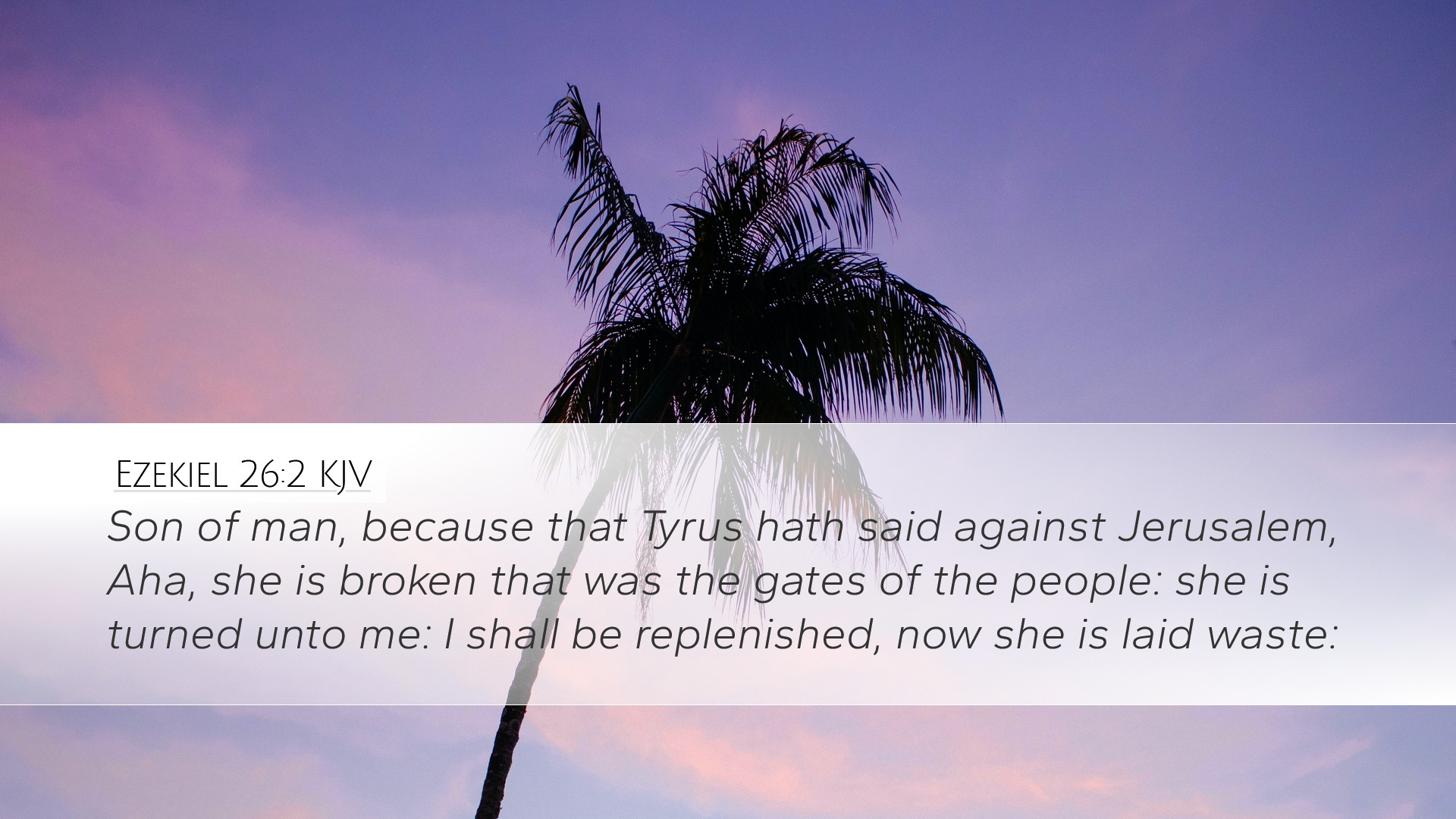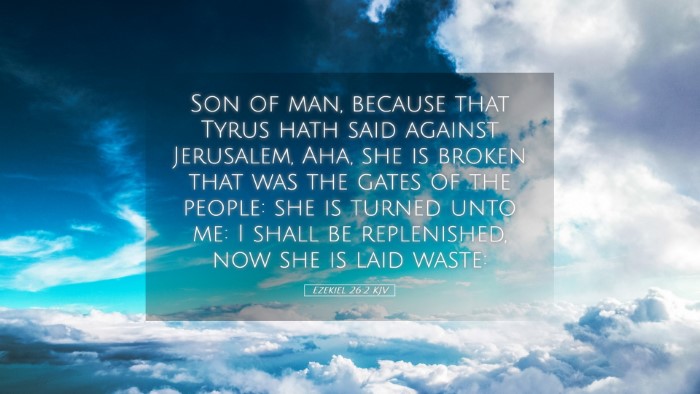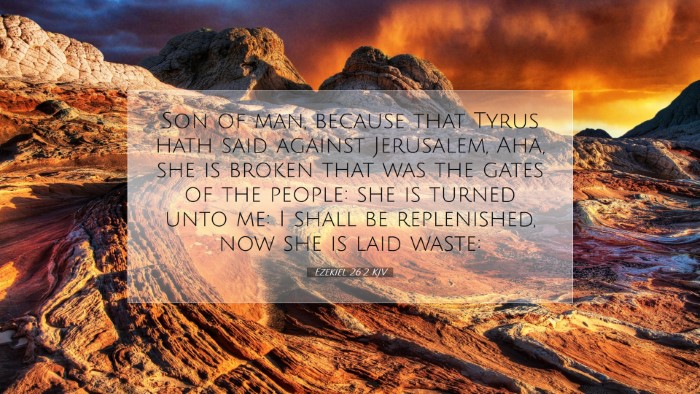Ezekiel 26:2 Commentary
Text of Ezekiel 26:2: “Son of man, because that Tyrus hath said against Jerusalem, Aha, she is broken that was the gates of the people: she is turned unto me: I shall be replenished, now she is laid waste.”
Introduction
The prophet Ezekiel, through his messages, focuses on the judgment and restoration of Israel and surrounding nations. In Ezekiel 26:2, the Lord announces impending judgments upon Tyre, a prominent city known for its wealth and trade. This verse illustrates the connection between Tyre's reaction to Jerusalem's downfall and the subsequent divine judgment it would experience. This commentary synthesizes insights from various public domain sources, including Matthew Henry, Albert Barnes, and Adam Clarke, to provide a comprehensive understanding of this passage.
Contextual Background
The passage occurs within a larger oracle against Tyre, delivered during a time of exile and societal turmoil for Israel. Tyre had historically been an adversary of the Israelites and had rejoiced at Jerusalem’s tribulations. Ezekiel’s prophecies serve to demonstrate not only God's sovereignty but also His interests in justice against nations that oppress and disdain His people.
Historical Significance of Tyre
Tyre, located on the Mediterranean coast, was a powerful Phoenician city renowned for its commerce and cultural significance. Its inhabitants prided themselves on their strength and influence. Throughout the Biblical narrative, Tyre often symbolizes human pride and the consequences of treating God’s people with contempt. The prophetic declaration in Isaiah 23 also highlights the role of Tyre in maritime trade and its eventual downfall. Both Ezekiel and Isaiah reveal the divine judgment upon cities that align themselves against God’s covenant people.
Verse Analysis
The Nature of Tyre's Statement
Tyre's expression of jubilation over Jerusalem’s demise indicates a state of arrogance and a misguided sense of security. Matthew Henry notes that Tyre's pride blinds it to the divine ramifications of its joy over another's disaster. This verse exemplifies how complacency and celebration over others' misfortunes can lead to one's own downfall, a theme prevalent throughout Scripture.
Divine Justice
In this verse, God addresses Tyre with a promise of recompense. The city believed that with Jerusalem's fall, it would gain advantage and prosperity, yet this perception is shattered by God’s impending judgment. Albert Barnes emphasizes the principle of retributive justice observed in this passage: those who indulge in the misfortunes of others will find themselves facing their own crises. This divine alignment with justice reinforces that God is sovereign over all nations, acting not only for Israel but also delivering judgment upon those who oppose His plans.
Theological Implications
The implications of Ezekiel 26:2 extend into vital theological themes, such as the nature of God’s judgment and the exultation of nations over the suffering of others. Adam Clarke expounds on the verse, suggesting that the downfall of one nation may lead to the temptation for others to feel invulnerable, leading to their eventual judgment. The divine response to Tyre's mockery of Jerusalem emphasizes God’s role as a defender of His people and His unwillingness to let injustice go unpunished.
Human Pride
Tyre's attitude of superiority highlights a critical warning about human pride. The verse serves as a reminder for leaders and nations to remain humble, recognizing that their strength is not an indicator of divine favor. The outcome for Tyre serves as a biblical archetype of the consequences of hubris, echoing the admonition found in James 4:10: "Humble yourselves in the sight of the Lord, and He will lift you up."
Practical Applications
For pastors, students, theologians, and Bible scholars, Ezekiel 26:2 offers rich material for meditation and application. Its lessons resonate across various dimensions of faith and daily living:
- Caution Against Pride: The dangers of pride and the importance of humility must be emphasized in the lives of believers and church leaders.
- Awareness of Consequences: Individuals and nations should be reminded of the consequences of unrestrained enthusiasm over others’ misfortunes.
- God’s Sovereignty: This verse affirms God's sovereignty over nations, encouraging believers to trust in His timing and justice in difficult circumstances.
- Compassion Over Condemnation: Believers should promote a spirit of compassion and seek to stand in solidarity with others who suffer, rather than reveling in their struggles.
Conclusion
Ezekiel 26:2 serves as an essential reminder of the relational dynamics between nations and the ethical imperatives of God's justice. The commentary from historical sources such as Matthew Henry, Albert Barnes, and Adam Clarke deepens the understanding of the text’s implications. By urging caution against pride and celebrating our collective human experience, we gain a clearer picture of our responsibility towards one another and our acknowledgment of God’s ultimate authority.


